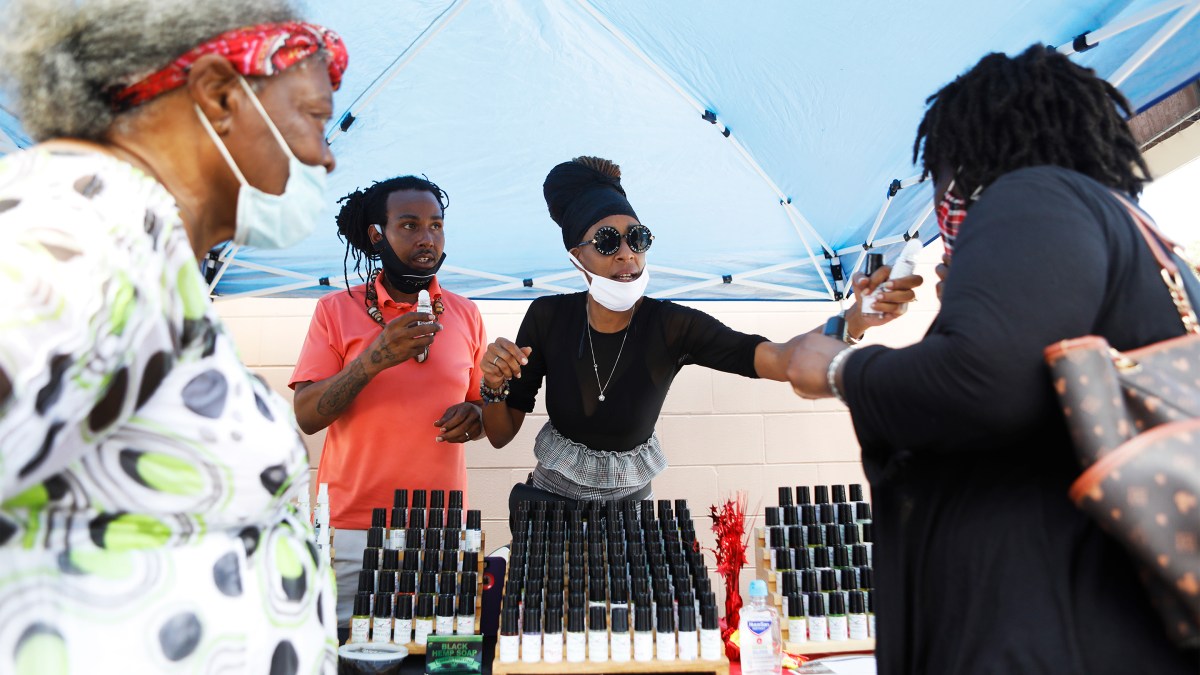
For the last several months, we’ve been watching the COVID-19 pandemic hit Black-owned businesses particularly hard. A new report from the New York Federal Reserve confirms it — and looks into the reasons why. A lot of it comes down to relationships with banks.
Getting that first round of Paycheck Protection Program funding was like running a race. And Vera Daniels was miles away from the starting line when the gun went off.
“I sent emails out to a listing of about 100 banks,” she said. “It just felt helpless.”
Daniels owns Wellness Tea Therapy, a teahouse and wellness center in Brooklyn, New York. She banks with a credit union, but it couldn’t help her apply for a loan. So she had to find a bank that would. But “the banks suggested that their primary concern would be their customers,” Daniels said.
She still hasn’t found funding. She’s pivoted to online sales and said she’s hanging in there. But a lot of other Black entrepreneurs can’t say the same. The number of Black business owners in the United States fell more than 40% between February and April, according to the New York Fed study. That’s more than double the decline of white business owners.
“We saw that there were real differences going into the crisis between Black- and white-owned businesses,” said Claire Kramer Mills, who co-authored the study.
She said a lot of this had to do with access to capital. Traditionally, Black businesses have had to look to friends or family, to 401(k)s, to short-term and often predatory lenders — and not to banks.
Meanwhile, Black-owned businesses are concentrated in places COVID-19 has hit hardest.
“These places have had a double whammy,” Kramer Mills said.
“It’s just like really worsening an already bad situation in the Black community,” said Belinda Archibong, professor of economics at Barnard College. She said Black health and Black wealth are intertwined. And the only way to change the outlook for Black-owned businesses where COVID-19 has hit hard is to directly allocate funds to them.
“And that’s something that needs to happen with federal regulation,” Archibong said, like a targeted federal loan program.
That’s important now that it’s clear this COVID-19 crisis is a marathon, not a sprint.
Additional reporting by Lukas Southard.
It’s still the question on everyone’s minds: What’s going on with extra COVID-19 unemployment benefits?
The $600-a-week payments have ended, officially, as of July 31. For now, there is no additional federal pandemic unemployment assistance. House Democrats want to renew the $600 payments. Senate Republicans have proposed giving the unemployed 70% of their most recent salary by this October, when state unemployment offices have had time to reconfigure their computer systems to do those calculations. Until then, jobless workers would just get another $200. But, nothing has been signed into law yet.
What’s the latest on evictions?
For millions of Americans, things are looking grim. Unemployment is high, and pandemic eviction moratoriums have expired in states across the country. And as many people already know, eviction is something that can haunt a person’s life for years. For instance, getting evicted can make it hard to rent again. And that can lead to spiraling poverty.
Which retailers are requiring that people wear masks when shopping? And how are they enforcing those rules?
Walmart, Target, Lowe’s, CVS, Home Depot, Costco — they all have policies that say shoppers are required to wear a mask. When an employee confronts a customer who refuses, the interaction can spin out of control, so many of these retailers are telling their workers to not enforce these mandates. But, just having them will actually get more people to wear masks.
You can find answers to more questions on unemployment benefits and COVID-19 here.
As a nonprofit news organization, our future depends on listeners like you who believe in the power of public service journalism.
Your investment in Marketplace helps us remain paywall-free and ensures everyone has access to trustworthy, unbiased news and information, regardless of their ability to pay.
Donate today — in any amount — to become a Marketplace Investor. Now more than ever, your commitment makes a difference.
Read More..